'Israel must be stopped' in Gaza, South Africa tells World Court
Anthony Deutsch and Stephanie van den Berg
Updated Thu, May 16, 2024
South Africa ask World Court for more emergency measures over Israel's Rafah offensive, in The Hague
By Anthony Deutsch and Stephanie van den Berg
THE HAGUE (Reuters) -South Africa urged the U.N.'s top court on Thursday to order a halt to Israel's offensive on Rafah, saying attacks on the southern Gaza city "must be stopped" to ensure the survival of the Palestinian people.
South Africa's ambassador to the Netherlands, Vusimuzi Madonsela, asked judges to order Israel to "immediately, totally and unconditionally, withdraw the Israeli army from the entirety of the Gaza Strip."
The two days of hearings at the International Court of Justice, also known as the World Court, are part of a case brought by South Africa accusing Israel of genocide.
Israel, which has denounced South Africa's claim that it is violating the 1949 Genocide Convention as baseless, will respond in court on Friday.
Last week South Africa asked for additional emergency measures to protect Rafah, where more than a million Palestinians have been sheltering.
South Africa also asked the court to order Israel to allow unimpeded access to Gaza for U.N. officials, organisations providing humanitarian aid, journalists and investigators.
Israel's military campaign has killed tens of thousands of children and women, destroyed civilian infrastructure and starved the population, South Africa's legal team told the court.
"From the onset Israel's intent was always to destroy Palestinian life and to wipe them off the face of the earth. Rafah is the final stand," Tembeka Ngcukaitobi, one of the legal team, said.
"Israel must be stopped. South Africa is before you again today to respectfully ask the court to invoke its powers ... to order a remedy that will stop Israel," said Adila Hassim, another lawyer for South Africa.
Posting on social media, Israel's Foreign Ministry said, "South Africa's claims are both morally and factually distorted" and Israel's military abides by international law.
"The terrorists of Hamas are using South Africa in their attempt to exploit the International Court of Justice (ICJ)," it said.
The Israel Defense Forces' operations against Hamas in Gaza "are carried out while implementing measures to minimize harm to civilians and civilian facilities, alongside the continuing transfer of humanitarian aid to the Gaza Strip," the foreign ministry said. It called on judges to reject South Africa's requests.
At least 35,272 Palestinians have been killed in Israel’s seven-month-old assault on the Gaza Strip, health officials in the enclave said on Thursday. The war began when Hamas militants attacked Israel on Oct. 7, killing 1,200 people and abducting 253 others. Of those, 133 are believed to remain in captivity in Gaza, according to Israeli tallies.
'MAN-MADE STARVATION'
Israel says it needs to eliminate Hamas for its own protection and in previous filings to the ICJ it has stressed that it has stepped up efforts to get humanitarian aid into Gaza as the court had ordered.
South Africa attorney Max du Plessis said Israel's declared humanitarian zones - areas it ordered Gazans into to avoid military operations - were a "cruel distortion" because people were often too starved to flee. Those strong enough to leave to shelters were sometimes attacked by Israeli forces.
"There is nothing humanitarian about these humanitarian zones," he said. "Israel's genocide of Palestinians continues through military attacks and man-made starvation."
Gilad Erdan, Israel's ambassador to the United Nations, told Army Radio on Wednesday that the short notice the court had given for this week's hearings did not allow sufficient legal preparation. That was "a telling sign", he said.
This week's hearings will only focus on issuing emergency measures and it will likely take years before the court can rule on the underlying charge of genocide.
In January, the court ordered Israel to ensure its troops commit no genocidal acts against Palestinians in Gaza, allow in more humanitarian aid and preserve any evidence of violations.
The ICJ's rulings and orders are binding and without appeal. While the court has no way to enforce them, an order against a country could hurt its international reputation and set legal precedent.
(Reporting by Stephanie van den Berg, additional reporting by Henriette Chacar in Jerusalem; Editing by William Maclean, Jon Boyle and Cynthia Osterman)
South Africa asks World Court to stop Israel's Rafah offensive
Reuters Videos TRANSCRIPT
Updated Thu, May 16, 2024
STORY: South Africa is urging the U.N.’s top court to order Israel to halt its offensive on Rafah.
On Thursday, South Africa’s ambassador to the Netherlands — Vusimuzi Madonsela — asked judges to order Israel to withdraw its army from the whole Gaza Strip.
"Israel's genocide has continued apace and has just reached a new and horrific stage.”
The two days of hearings at the International Court of Justice are part of a case brought by South Africa accusing Israel of genocide.
Last week, South Africa asked for extra measures to protect Rafah, where more than a million Palestinians have been sheltering.
It also wants the court to order Israel to allow U.N. officials, humanitarian aid groups, journalists and investigators unimpeded access to the enclave.
Israel is set to respond in court on Friday.
It has described South Africa's claims as baseless and on social media Israel's Foreign Ministry said its military abides by international law.
More than 35,000 Palestinians have been killed in Israel's assault on Gaza, according to health officials there.
The war began when Hamas militants attacked Israel on Oct. 7, killing 1,200 people and abducting more than 250 others, according to Israeli tallies.
Israel says it needs to eliminate Hamas for its own protection.
In January, the court ordered Israel to ensure its troops commit no genocidal acts against Palestinians in Gaza, allow in more humanitarian aid and preserve any evidence of violations.
In filings, Israel has stressed that it's stepped up efforts to get aid into Gaza.
This week's hearings will only look at emergency measures.
It will likely be years before the court can rule on the charge of genocide.
The court's rulings and orders are binding and cannot be appealed.
While the court has no way to enforce them, an order against a country could hurt its international reputation and set legal precedent.
South Africa urges UN court to stop Israel assault on Rafah
Mathias Hammer
Thu, May 16, 2024
Semafor Logo
Semafor Signals
Insights from The Washington Post, Financial Times, and Middle East Eye
The International Court of Justice should order Israel to halt its Rafah offensive and step up efforts to protect civilians in Gaza, South Africa argued Thursday, as hearings in its genocide case against Israel got underway.
Lawyers argued before the UN’s highest court that Israel’s attack on Rafah constituted an “extreme risk” to humanitarian aid delivery, to the medical system in the enclave, and to “the very survival of Palestinians in Gaza as a group.”
One South African official called on the court to order Israel to “immediately, totally and unconditionally, withdraw the Israeli army from the entirety of the Gaza Strip.”
Israel will respond to South Africa’s accusations on Friday.
While the legal fight is just beginning, Israeli officials are increasingly divided on how to end the war in Gaza and who will govern the strip after the conflict is over.
icon
SIGNALSSemafor Signals: Global insights on today's biggest stories.
Experts expect the ICJ to take action against Israel
Source icon
Sources: The Washington Post, Middle East Eye
While the ICJ is expected to deliberate on this week’s legal arguments for some time, experts predict it will likely call for Israel to take additional steps to protect civilians. However, the court’s rulings are legally binding but not enforceable in practice, and it has already issued similar orders that Israeli officials have rejected. “They might order Israel … to do what they can to achieve a ceasefire. Or they may go further and order a ceasefire directly,” Juliette McIntyre of the University of South Australia told The Washington Post. Israel has described the case as “wholly unfounded,” and its lawyers are expected to push back against South Africa’s claims.
Divisions in Netanyahu’s war cabinet widen
Source icon
Sources: The Washington Post, Jewish News Syndicate, The Wall Street Journal
Tensions are high among Israel’s leadership, with defense officials and Prime Minister Netanyahu publicly sparring over the future of Gaza. Defense Minister Yoav Gallant said the only long-term solution was empowering “local Palestinian actors backed by international actors,” to avoid Israeli soldiers getting permanently stationed in Gaza. Netanyahu harshly criticized the proposal, saying “I am not willing to exchange Hamastan for Fatahstan,” a reference to Palestinian Authority leader Mahmoud Abbas’s ruling Fatah party. The long-standing tension between Gallant and Netanyahu means both men have sought to bypass each other on key decisions, The Wall Street Journal reported.
International peacekeeping isn’t a popular solution
Source icon
Sources: Al Jazeera, Financial Times
A coalition of Arab countries on Thursday called for a UN peacekeeping force to be deployed in Gaza, the latest in a series of proposals that try to envision a longer-term security solution for the enclave. US officials told the Financial Times they want to cobble together an Arab peacekeeping force, and there is no desire from the Biden administration to deploy American troops in Gaza. But Arab states are skeptical about deploying their own forces in Gaza and worried about appearing complicit with Israel or facing a Hamas insurgency themselves. So far, the different plans appear to have little momentum. “Israel is refusing to talk to anybody about it, it’s in denial. And everyone else is talking past each other,” one Western official told the FT.
Israel to hit back at 'genocide' claims at UN top court
Richard CARTER
Thu, May 16, 2024
South Africa has accused Israel of genocidal acts in Gaza (Nick Gammon)
Israel will on Friday hit back in the United Nations' top court at allegations from South Africa that it has escalated a campaign of "genocide" with its military operation in Rafah.
Pretoria has urged the International Court of Justice (ICJ) to order a stop to the Israeli assault on Rafah, which Israel says is key to eliminating Hamas militants.
Israel has previously stressed its "unwavering" commitment to international law and described South Africa's case as "wholly unfounded" and "morally repugnant".
Prime Minister Benjamin Netanyahu ordered the Rafah offensive in defiance of US warnings that more than a million civilians sheltering there could be caught in the crossfire.
Netanyahu argued Wednesday that "we have to do what we have to do" and insisted that mass evacuations there had averted a much-feared "humanitarian catastrophe".
Israel's Defence Minister Yoav Gallant said Thursday that the operation in Rafah "will continue as additional forces will enter" the area.
On Thursday, judges heard a litany of allegations against Israel from lawyers representing Pretoria, including mass graves, torture and deliberate withholding of humanitarian aid.
"South Africa had hoped, when we last appeared before this court, to halt this genocidal process to preserve Palestine and its people," said top lawyer Vusimuzi Madonsela.
"Instead, Israel's genocide has continued apace and has just reached a new and horrific stage," added Madonsela.
- 'Protection from genocide' -
In a ruling that made headlines around the world, the ICJ in January ordered Israel to do everything in its power to prevent genocidal acts and enable humanitarian aid to Gaza.
But the court stopped short of ordering a ceasefire and South Africa's argument is that the situation on the ground -- notably the operation in the crowded city of Rafah -- requires fresh ICJ action.
The Rafah campaign is "the last step in the destruction of Gaza and its Palestinian people", argued Vaughan Lowe, a lawyer for South Africa.
"It was Rafah that brought South Africa to the court. But it is all Palestinians as a national, ethnical and racial group who need the protection from genocide that the court can order," he added.
The orders of the ICJ, which rules in disputes between states, are legally binding but it has little means to enforce them.
It has ordered Russia to halt its invasion of Ukraine, to no avail.
South Africa wants the ICJ to issue three emergency orders -- "provisional measures" in court jargon -- while it rules on the wider accusation that Israel is breaking the 1948 UN Genocide Convention.
It wants the court to order Israel to "immediately" cease all military operations in Gaza, including in Rafah, enable humanitarian access and report back on its progress on achieving these orders.
ric/rlp/lb
MOLLY QUELL
Thu, May 16, 2024
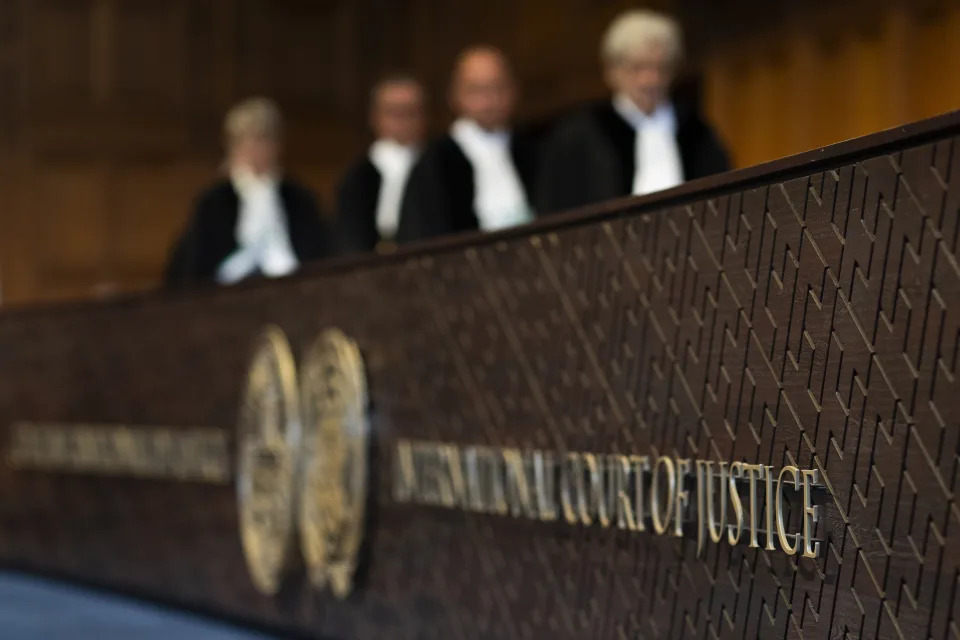
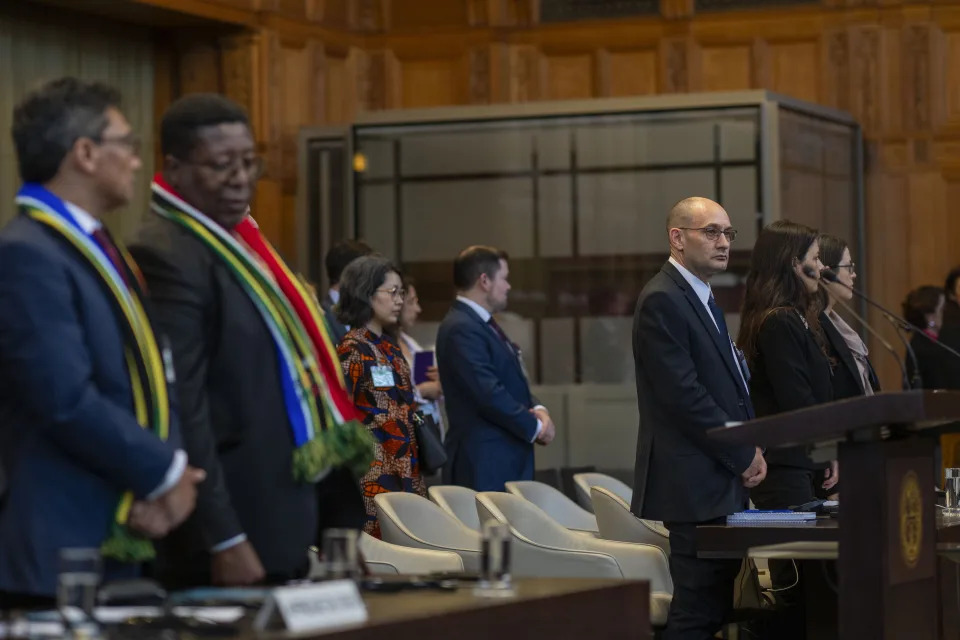
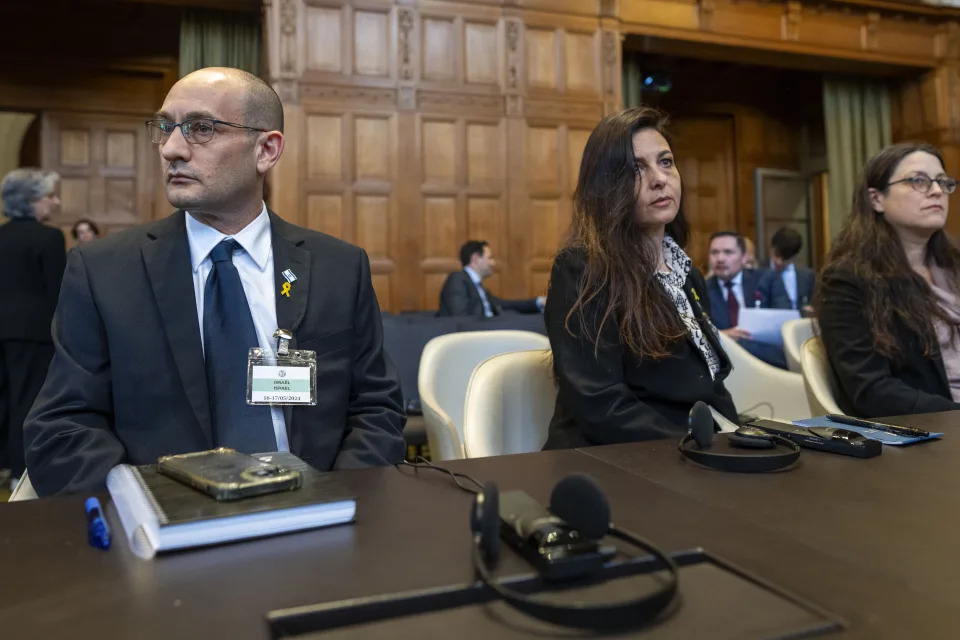
Israel's agents Gilad Naom, left, Tamar Kaplan Tourgeman, center, and co-agent Avigail Frisch Ben Avraham, right, wait for the start of hearings at the International Court of Justice, in The Hague, Netherlands, Thursday, May 16, 2024. The U.N.'s top court opened two days of hearings in a case brought by South Africa to see whether Israel needs to take additional measures to alleviate the suffering in war-ravaged Gaza.
THE HAGUE, Netherlands (AP) — Israel will respond to charges of genocide at the United Nations’ top court on Friday, after South Africa filed an urgent request with the court to order a cease-fire in Gaza.
It's the third time that the International Court of Justice, or ICJ, has held hearings on the Israel-Hamas war since South Africa filed proceedings at The Hague-based court in December..
On Thursday, South Africa told the court that the situation in Gaza has reached “a new and horrific stage,” and urged the 15 judges to take urgent action. Israel must “totally and unconditionally withdraw” from the Gaza Strip, said Vusimuzi Madonsela, South Africa's ambassador to the Netherlands.
South Africa has submitted four requests for the ICJ to investigate Israel. According to the latest request, the country says Israel's military incursion in Rafah threatens the “very survival of Palestinians in Gaza.”
During hearings earlier this year, Israel strongly denied committing genocide in Gaza, saying it does all it can to spare civilians and is only targeting Hamas militants. Israel says Rafah is the last stronghold of the militant group.
In January, judges ordered Israel to do all it can to prevent death, destruction and any acts of genocide in Gaza, but the panel stopped short of ordering an end to the military offensive.
The court has already found that there is a “real and imminent risk” to the Palestinian people in Gaza by Israel’s military operations.
“This may well be the last chance for the court to act,” said Irish lawyer Blinne Ní Ghrálaigh, who is part of South Africa’s legal team.
ICJ judges have broad powers to order a cease-fire and other measures, though the court doesn't have its own enforcement apparatus. A 2022 order by the court demanding that Russia halt its full-scale invasion of Ukraine has so far gone unheeded.
Most of Gaza’s population of 2.3 million people have been displaced since fighting began.
The war began with a Hamas attack on southern Israel on Oct. 7 in which Palestinian militants killed around 1,200 people and took about 250 hostages. More than 35,000 Palestinians have been killed in the war, Gaza’s Health Ministry says, without distinguishing between civilians and combatants in its count.
South Africa initiated proceedings in December 2023 and sees the legal campaign as rooted in issues central to its identity. Its governing party, the African National Congress, has long compared Israel’s policies in Gaza and the occupied West Bank to its own history under the apartheid regime of white minority rule, which restricted most Blacks to “homelands.” Apartheid ended in 1994.
On Sunday, Egypt announced it plans to join the case. Several countries have also indicated they plan to intervene, but so far only Libya, Nicaragua and Colombia have filed formal requests to do so.
___
Follow AP's coverage at https://apnews.com/hub/israel-hamas-war
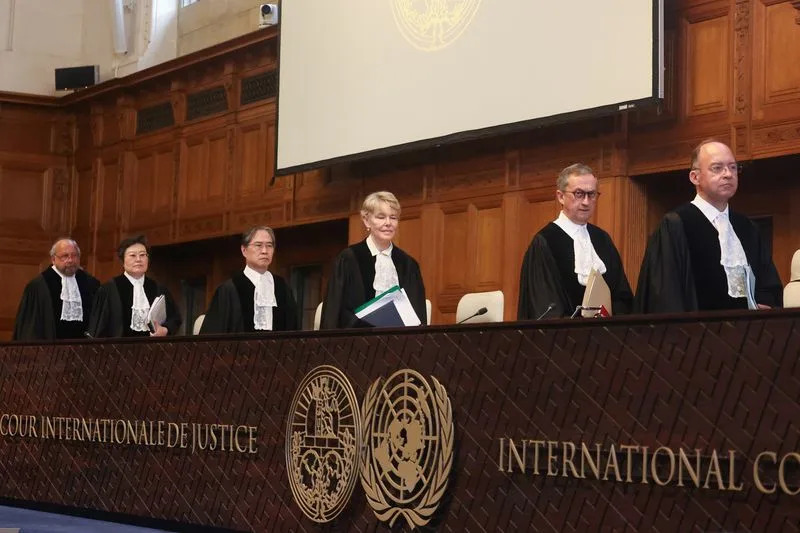
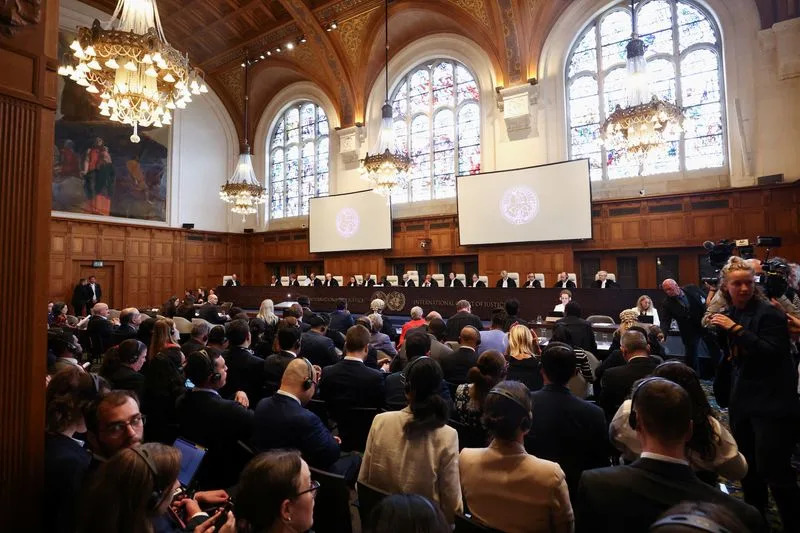



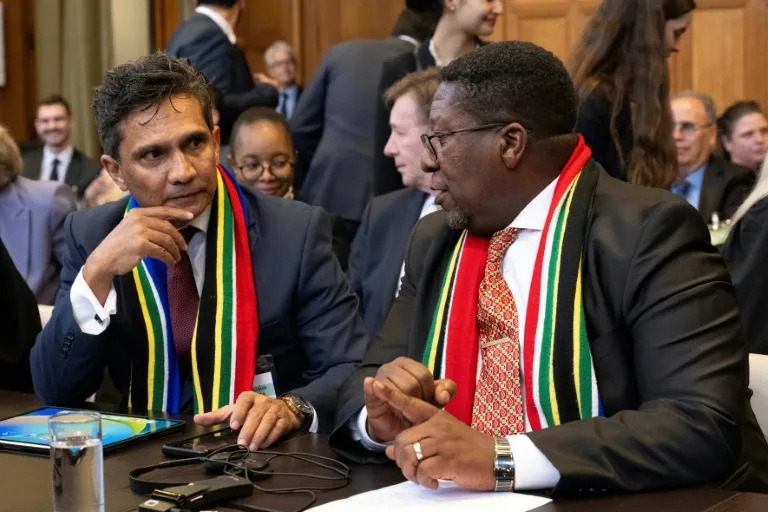
No comments:
Post a Comment